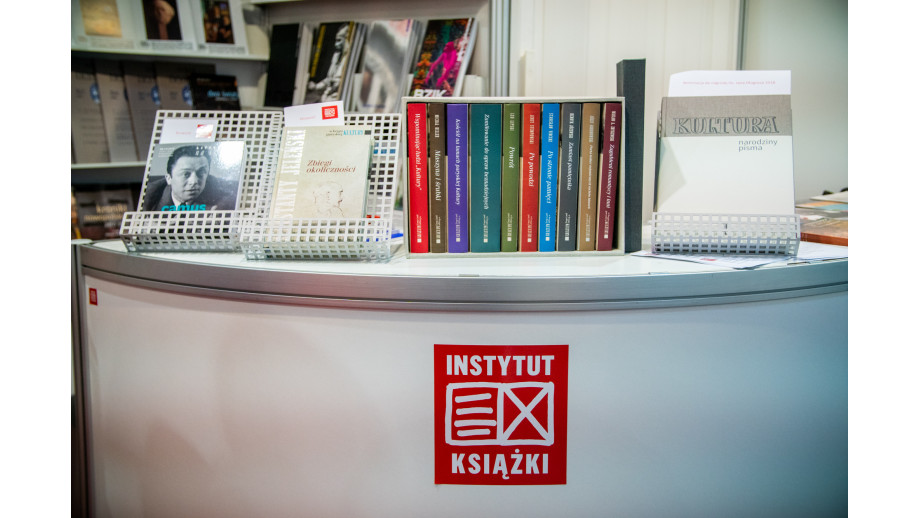News

The Polish Book Institute at the 22nd International Book Fair in Cracow [report and photos]
The Polish Book Institute held three discussions at the 22nd International Book Fair in Cracow. Here we present photos and reports from the panels.
Mysterious, armed, and dangerous: who is a literary agent in Poland today?
The profession of literary agent is still very poorly known in Poland, shrouded in mystery or overgrown with misunderstanding. What does it look like day to day? What should be done to sell rights to a foreign title in Poland, and what should be done to promote a Polish writer abroad? This is one of the topics discussed during a panel organised by the Polish Book Institute at the 22nd International Book Fair in Cracow. The issue was discussed by Agnieszka Urbanowska, editor and specialist for international projects at the Book Institute, as well as agents Anna Rucińska and Piotr Wawrzeńczyk.
What is the basic role of an agent? Piotr Wawrzeńczyk from the Book/lab agency answered the question by saying, "The agent always represents the interests of the author or rights holders. At the end of the day, their role is to negotiate the best offer for the author.” Co-agents, i.e. local co-workers who offer in-depth knowledge of a given market, cooperate with the agents.
The work of an agent is primarily about e-mails, meetings at publishers' offices, and book fairs. But what determines where a given writer will end up? As it turns out – it’s not only money. "The best conditions do not always have to mean the biggest money,” said Anna Rucińska from Andrew Nurnberg Associates Warsaw. “We don't necessarily decide on a strong, large publisher, because, in their large catalogue, our book can simply disappear. A smaller publisher will be more involved in promotion. The remuneration does not have to decide. Promotional and ideological factors also play a role.”
"It is not always the case that the one who pays the most, promotes the best". - added Wawrzeńczyk. It is important for the publisher to have a plan to promote and introduce the author to the market.
Anna Rucińska also talked about helping Polish authors find a foreign publisher. Piotr Wawrzeńczyk, in turn, talked about something that is not popular in Poland yet, namely, agents working with authors from the very beginning through to the end, i.e. from the first sentence to signing the contract and promoting the completed book.
The discussion also featured a topic that is important from the point of view of Polish authors: what must a Polish author have in order for them to be sold all over the world? "They must be original. As far as prose is concerned, the editors want to see our world, Poland. Of course, they are also interested in the quality of writing. A brilliant text does not have to be about Poland, sooner or later, it will be sold. We try to choose topics in such a way so as to present them with something they don't know," said Rucińska.
Who is the agent? According to Rucińska and Wawrzeńczyk, an agent is both a lover of literature, who can enthuse, as well as a tough negotiator. But their role goes beyond sales and 20% commission: it is not rare that the agent takes on the role of a promoter of interesting authors and phenomena. "It is not an art to sell a foreign bestseller. If our role was limited to that, we could be replaced by an application," said Wawrzeńczyk.
The agents also told Agnieszka Urbanowska and the audience about the legal aspects of their industry and its dark sides, such as the termination of contracts with publishers.
***
Reading. Hope in children?
Włodzimierz Albin, Maria Deskur, Helena Gomer, Tomasz Makowski, Martin Widmark, and Katarzyna Wasiutyńska talked about Polish and Swedish experiences in the field of supporting reading among the youngest. The discussion, led by writer and translator Katarzyna Tubylewicz, took place as part of the 22nd International Book Fair in Cracow.
At the very beginning of the panel, Maria Deskur, Managing Director of Egmont Publishing House and President of the Council of the Common Reading Foundation, noted that reading creates a level playing field for opportunities and, indeed, children may be our hope, "but hope is in us".
"I believe that we cannot put the responsibility on children. Children do what adults do. We spend too much time on the phone and using social media. Every type of reading is good, not just reading books," said Helena Gomer, director of the innovative library in Södertälje. In Södertälje, children are encouraged to read by being visited in their homes and receiving books in two stages, and then they are invited to visit the library for the first time at the age of 18 months.
"Children don't read to please us. They read because the book is interesting," emphasised Gomer at the end.
Tomasz Makowski, the Director of the National Library, referred, with some optimism, to the situation of reading in Poland, "It is better, there are a few good signs. Children and young people read more. It is adults that read the least. For the last two years, the number of books given as gifts has been growing significantly according to research. This is a very good prognosis. It is also the result of half a million events that are organised in libraries every year.
Martin Widmark, a popular children's books writer, agreed with Deskur and Gomer’s points of view, "Adults must take responsibility, especially when it comes to reading aloud to children". The Swedes used to read almost universally, but the introduction of smartphones led this situation to deteriorate.
Only today do they return to the 2001 level. According to Widmarek, the key to encouraging children to read is to learn to read wisely. "We work very hard and consciously to reduce the gap between the different layers of society. We have huge problems, especially when it comes to segregation. We are trying to reunite the country afresh. Society has split between those who read and those who do not read.
“All hope in children? No, all hope in young people. The question of responsibility is important. Young people who start families are the most important. We have created a programme that is comprehensive and includes both a newborn and a parent,”
stated Katarzyna Wasiutyńska from the Polish Book Institute, explaining the details of the "Small Book - Great Man" project.
What steps are the Swedes taking to combat declining reading levels? Undoubtedly, the key to this is the huge investment in the promotion of reading. Kindergarten libraries will be built in Sweden. The project, which Martin Widmark talked about, will cost €5 million.
It is also important to reach out to children in an appropriate way. "Children are much smarter and faster than we think. Of course, their language does not keep pace with their imagination and thought. The language must be adapted to the age group, and the intrigue is set at a higher level than one would like it to be set. At least that’s what I do in my books," noted of Widmark at the end.
***
Read to me, Daddy. Why should men read to children?
On Friday, Prof. Krzysztof Biedrzycki, Maria Deskur, and Rafał Witek discussed the role of a father in imbuing children with the habit of reading. The panel of the Book Institute at the 22nd International Book Fair in Cracow was chaired by Krzysztof Cieślik.
Researchers from Harvard have proved that reading by fathers is more effective because it violates conventions. Children, especially in their first year of life, are taken care of more often by their mothers. That is why every ritual, which is reserved for a father, arouses more interest in the infant.
"It is not the case that at some point, we will convince fathers that they should read. There is a lot of hard, cultural work ahead of us", said Krzysztof Biedrzycki from the Jagiellonian University, associate professor at the Educational Research Institute in Warsaw, referring to the PISA reading research.
Maria Deskur, Managing Director of the Egmont Publishing House and President of the Council of the Universal Reading Foundation, noted that the Duursma research was conducted on poor families, where differences are the most pronounced. She added, however, that,
“Fathers have more fun with the text, they have a reflex to go beyond the text itself, they interact with the text. This is very helpful for children when compared to a flat reading of a text.”
"A severe reading crisis occurs at the age of 12-13 and, at this point, the paths of boys and girls abruptly diverge. Boys, in large numbers, refuse to read, even school reading," noted Prof. Biedrzycki. In England, for example sports coaches, who are role models for boys, encourage them to read.
“Fathers who do not read are not role models for their sons, but they do not talk to them either. Not only do they not talk about books, they do not do it at all,”
added Prof. Biedrzycki. It is the conversation that turns out to be decisive - the boys who read have strong emotional contact with their fathers.
Positive effects of paternal reading can also be observed in the case of pre-schoolers. Those whose fathers started reading to them improved their educational results by as much as a third. The youngsters whose fathers were involved in developing their language skills, and read a lot themselves, are later found in the group of people with a high reading rate.
"We can see today that mothers read more, if anyone reads to children at all. It would be good if these proportions were less distorted," said Maria Deskur, suggesting that strong arguments should be used to convince fathers: "For God’s sake, if you do not read, these women will be more intelligent, more emotionally developed, and more socially competent. I do not want to be an anti-feminist, but balance is in our common interest. I want the men of the future to be intelligent, also emotionally, and to be able to find their place in society.”
Rafał Witek, the author of popular children's books, joined the discussion in an interesting way and looked at the problem from a sociological point of view.
“We, guys, should keep up with how the world has changed. Once, after the first period of maternal care, the child went under the guardianship of their father, who taught them a profession or fencing. In the world of information, reading is a tool. And this is what we need to understand,”
summed up Witek.
Gallery

































